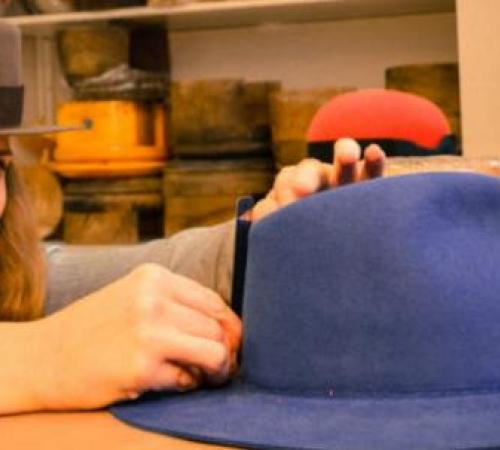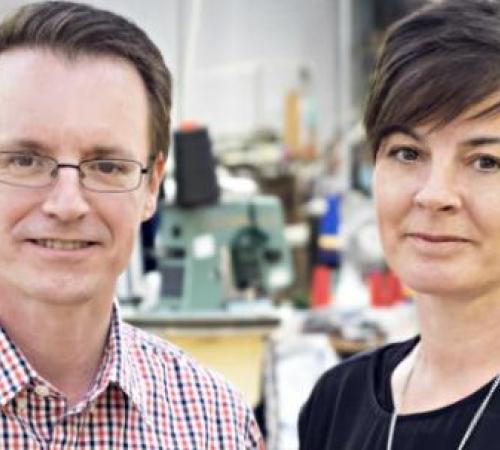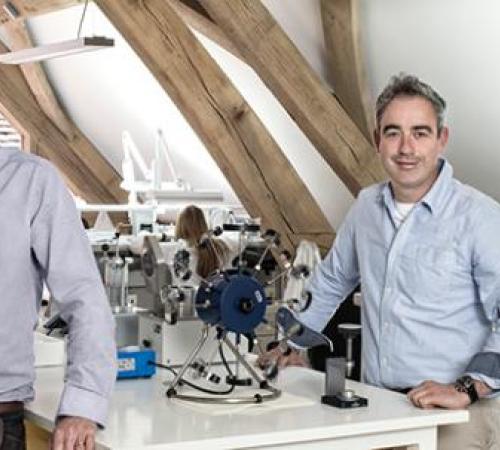
Linkee – the successful business that rejected a Dragons’ Den offer

Picture: (left to right) Dean Tempest, Tristan Williams, Ben Drummond
Ever wondered what it is like to walk into the Dragons’ Den and try to sell them your business idea? Dean Tempest can tell you. "It is like the worst job interview ever. It is horrendous," he says. It is, he admits, the most nerve-racking thing he has done in his life.
Dean and his partners Ben Drummond and Tristan Williams went on the BBC Two show with their family quiz game Linkee and became a rare thing: a deal that got away from the Dragons.
There are now quite a few stories of entrepreneurs who have been roundly rejected on the show yet gone on to success. The Tangle Teezer, a hair brush for knotted hair, was branded 'hare brained' (naturally) on Dragons’ Den in 2007 but has made millions for inventor Shaun Pulfrey and is used by celebrities such as Victoria Beckham and Cara Delevingne – they obviously didn’t hear Deborah Meaden dismiss it as being like a ‘horse brush’.
The Destination London board game, created by former taxi driver Rachel Lowe, was rejected in 2004 but became Hamleys’ best-selling game of the year. And Trunki, a sit-on wheelie suitcase for children invented by Rob Law, was also dismissed, yet has now had sales of more than £100 million. Although to be fair to the Dragons, it didn’t impress when the handle of the prototype came away in Theo Paphitis’s hands.
However, it takes a special form of bravery to turn your back when the Dragons have offered you £50,000. But that’s exactly what the Linkee team did.
The trio worked at an advertising agency and the idea for the game came from Tristran, while Ben did the design. It looked like a hit when the creative department at the agency enjoyed playing it in the office so much.
The idea is that you have to answer four questions and find the link between them. For instance: 1. Star Trek quote: Beam me up ——- 2. A sexy hoarse or rough voice 3.Muhammad Ali was the greatest what? 4. Baa baa black —–.
And the link is . . . dogs (Scottie, Husky, Boxer, Sheep). Don’t worry – they get much harder than that.
With the creative side under control, Dean brought the business acumen.
"I quit my job and they used to give me a bit of cash out of their salaries each month while I figured out how we were going to launch it."
They put the game into production but were still a very small-scale operation when they went into the Den.
"We launched in 2012 and in our first year we sold about 2,000 units. Then the next year we went on Dragons’ Den and we sold 50,000 units."
They were invited to go on the show. "We were doing a lot of consumer shows and trade shows and someone approached us – they liked the look of our product and the way we were pitching it and they asked us if we wanted to audition for the show.
"When we got asked to go on, we thought 'we’ll go with it, to see what happens' – which is our approach to a lot of things. And we got through the first round and the second round and before we knew it, we were walking out of the lift."
Anyone who has watched Dragons’ Den knows how nervous the pitchers can get when they face the Dragons. Dean can understand why.
"We’d done a lot of preparation and we weren’t worried about presenting. But the thing is that you have no interaction with them before the doors open. We were the last ones to go on that day and we had to wait in the green room for 10 hours. So by that time, we had been over it so many times we were all a bit frazzled," recalls Dean.
"I was the numbers man so, unfortunately, I had to learn all the numbers. I turned into Rain Man when they started asking questions. I just spewed it all out and then took a deep breath and they were all sat there making notes and going 'Oh okay, that all adds up'. The numbers weren’t that significant, but you don’t want to get caught out on anything like that."
Duncan Bannatyne offered them £50,000 for a 40pc share in the business.
"It was a bit of a silly offer – we were never going to accept it. To give 40 pc of your business to anyone is a bad idea. It would be very hard to get motivated if you have given away that much."
So, they walked away with nothing. Except for a 12-minute slot on television which changed their business almost instantly.
"We were very fortunate because we saw the power of Dragons’ Den without having to give anything away – just in terms of the exposure our edit got and how it captured people’s imaginations, and Linkee just took off on the back of that.
"There were a couple of big retailers I had been knocking on the door of – I was running the business out of my bedroom at the time – but it was hard to get a meeting to present our game," says Dean. "But with one big high-street retailer, I actually had a phone call on the night the show went out, asking if we could meet, so they could list the product. It really does open doors."
But these things don’t happen by accident. The Linkee team were aware of the opportunity the Den offered, and had made canny preparations.
"We made sure we made the most of it. We hired a PR team to make sure we got as many column inches as we could off the back of it. We signed up with a distributor just before the programme so that every retailer who wanted our product could get it quickly. We figured out that the show is there to maximise as much entertainment out of us as they can so we were going to maximise as much progression for the business as we could."
However, Dean is aware it could easily have gone another way.
"We had a really good edit. But of course, it could have been a really bad edit. Bearing in mind that we filmed for about an hour and a half, and you get 12 minutes out of that, you can take any story you like out of the time in the Den. There were bits we messed up or little bits we got caught up on, but they were pretty good to us, because we were really together. They told a really nice story about the game and what we were trying to do with it."
Suddenly the business was going places – and they didn’t miss Duncan Bannatyne’s money.
"We had needed money to buy more stock. But by renegotiating with our supplier, and getting better credit, we were able to bulk order stock. We had also needed money for marketing – but, actually, we then didn’t need money for marketing because we had just been on BBC Two for 12 minutes on Sunday primetime!"
The game has been a hit in Europe and the USA and now offers a children’s version, Dinkee Linkee, as well as a new mobile app. For Dean and the Linkee team, Dragons’ Den was a turning point.
‘I would say to anyone with a business idea, definitely go for it. Apply and see how you get on. And if you do go through and get an edit, then max it out. Do everything you can to make the most of it. You will never get another opportunity like it.’
Find out more about Linkee (external link).
What’s your most nerve-wracking business pitch experience? Let us know
Disclaimer:
At Hiscox, we want to help your small business thrive. Our blog has many articles you may find relevant and useful as your business grows. But these articles aren’t professional advice. So, to find out more on a subject we cover here, please seek professional assistance.






